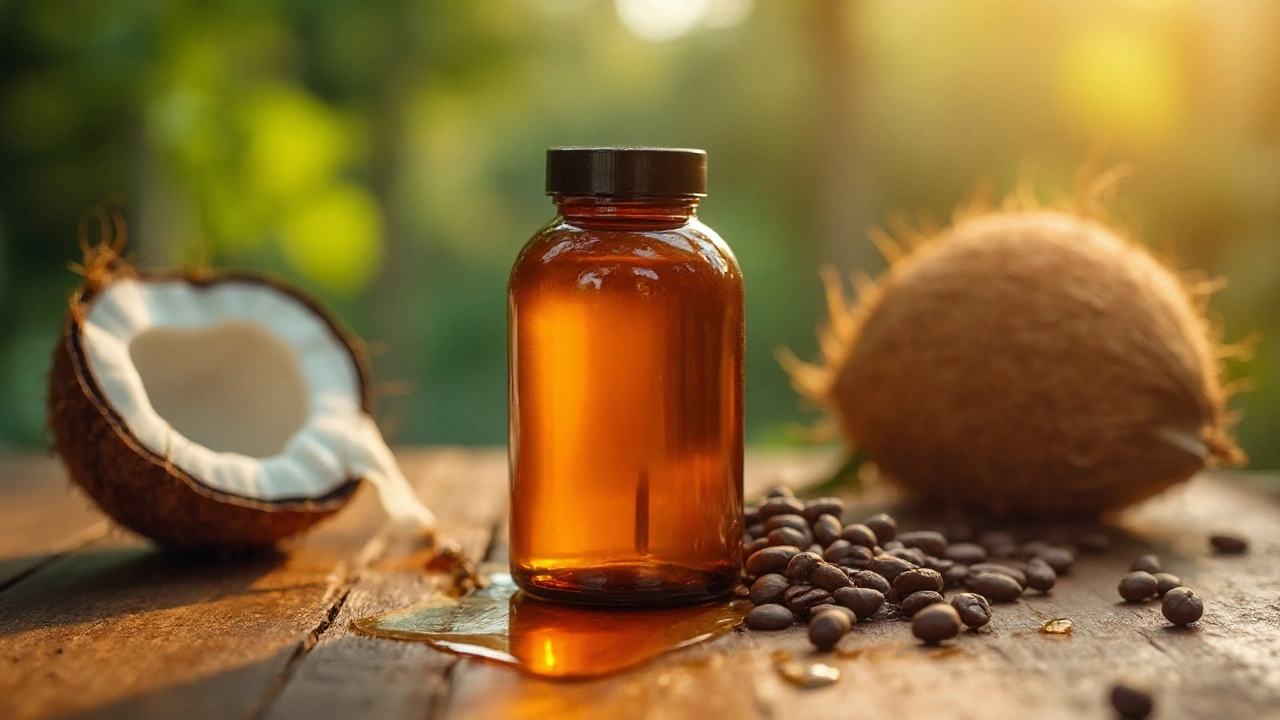MCT supplements are a type of dietary product that supplies medium chain triglycerides (MCTs) in a fast‑absorbing form, aimed at increasing ketone levels, supporting mental focus, and aiding weight control. Whether you’re on a keto plan, a busy professional looking for a brain boost, or an athlete chasing quick energy, these capsules or liquids have become a staple. This guide walks you through the science, practical usage, and how to pick a quality option.
What Are Medium Chain Triglycerides?
Medium chain triglycerides (MCTs) are fatty acids with carbon chain lengths of 6 to 12 atoms. Their short structure lets the liver convert them straight into ketone bodies-beta‑hydroxybutyrate, acetoacetate, and acetone-without needing the lengthy digestion steps that long‑chain fats require. This rapid conversion is why MCTs are prized for fast, clean energy.
How MCT Supplements Work in the Body
When you ingest an MCT supplement, the stomach empties the oil quickly into the small intestine where pancreatic lipase splits it into free fatty acids. Those acids travel directly to the portal vein and reach the liver within minutes. Inside the liver, enzymes perform beta‑oxidation, producing ketone bodies that circulate to the brain, muscles, and heart.
Because ketones cross the blood‑brain barrier efficiently, many users report sharper focus and fewer energy crashes during the mid‑morning slump.
Key Health Benefits
- Weight Management: MCTs increase satiety hormones (like peptide YY) and raise resting metabolic rate, helping a modest 3‑5% reduction in body fat over 12 weeks in controlled trials.
- Enhanced Cognitive Function: Studies on athletes and older adults show a 12‑15% improvement in short‑term memory tests after daily MCT intake.
- Support for Keto and Low‑Carb Diets: By supplying an exogenous source of ketones, MCTs make the transition into nutritional ketosis smoother and reduce the “keto flu.”
- Exercise Performance: Endurance athletes experience a 5‑7% increase in time‑to‑exhaust when MCTs are taken before training.
- Gut Health: Certain MCTs, especially caprylic acid, exhibit antimicrobial properties that can balance gut microbiota.
Types of MCT Oils and Their Attributes
Not all MCT oils are created equal. The main fatty acids differ in chain length, taste, and ketone yield.
| Source | Main Fatty Acid | Ketone Yield (mmol/L) | Taste | Typical Price per 100ml (GBP) |
|---|---|---|---|---|
| C8 (Caprylic Acid) | Caprylic (C8) | ~0.6 | Neutral | £2.50 |
| C10 (Capric Acid) | Capric (C10) | ~0.4 | Lightly Coconut | £2.00 |
| C8+C10 Blend | Mixed C8/C10 (50/50) | ~0.5 | Balanced | £2.20 |
| Coconut Oil | Mixture (C8-C12) | ~0.2 | Distinct Coconut | £1.80 |
Pure C8 delivers the highest ketone boost but can be pricier. Blend formulas offer a smoother taste while still providing a solid rise in blood ketones. Coconut oil contains only about 10% MCTs, so you need a larger volume to match the effect of a dedicated MCT supplement.
Dosage, Timing, and Practical Tips
- Start low: 1 teaspoon (≈5ml) per day for the first week to let your gut adapt.
- Gradually increase to 1-2 tablespoons (15-30ml) split across morning and pre‑workout doses.
- For ketosis support, consume within 30minutes of a low‑carb meal or during a 12‑hour fasting window.
- If you crave coffee, stir 1 teaspoon of MCT oil into a hot brew - the fat slows caffeine release, reducing jitters.
- On high‑intensity workouts, take 10ml 30minutes prior to boost fatty‑acid oxidation without stomach upset.
Always pair MCT intake with adequate hydration; the rapid metabolism can increase water loss.

Choosing a High‑Quality MCT Supplement
When the market is flooded with “MCT oil” bottles, look for these quality flags:
- Purity: ≥ 95% MCT content, preferably with a clear C8/C10 breakdown on the label.
- Extraction Method: Cold‑pressed or expeller‑pressed processes retain fatty‑acid integrity. Avoid solvents like hexane.
- Certifications: Look for GMP, ISO‑9001, or third‑party lab analysis (e.g., COA) confirming absence of trans fats.
- Flavoring: Unflavored or naturally flavored with vanilla or cacao are better for mixing into smoothies.
- Packaging: Dark glass bottles protect oils from oxidation caused by light.
Brands that publish batch‑specific lab reports tend to be more trustworthy.
Potential Side Effects and Who Should Avoid MCTs
Because MCTs are rapidly metabolized, some users experience gastrointestinal discomfort-bloating, cramping, or loose stools-especially at doses above 30ml. To minimize:
- Increase intake gradually.
- Take with a small amount of food.
- Choose a C8‑dominant product; the shorter chain is easier on the gut.
People with pancreatitis, liver disease, or a known allergy to coconut should consult a healthcare professional before adding MCTs.
Related Concepts: Putting MCTs in Context
Understanding MCT supplements becomes easier when you see how they intersect with broader nutrition strategies.
- Keto diet - a low‑carb, high‑fat regimen that relies on endogenous ketone production; MCTs act as an “exogenous shortcut.”
- Intermittent fasting - time‑restricted eating that raises baseline ketones; adding MCTs can deepen the fasted state without breaking the fast.
- Ketone bodies - the energy molecules (β‑hydroxybutyrate, acetoacetate, acetone) that power the brain and muscles when glucose is scarce.
- Caprylic acid (C8) - the most ketogenic MCT, often highlighted in “pure C8” products.
- Capric acid (C10) - a slightly longer chain that offers a milder taste and still contributes to ketone production.
- Coconut oil - a whole‑food source containing ~10% MCTs; useful for cooking but less efficient for rapid ketone spikes.
Exploring these related topics can help you fine‑tune a personalized nutrition plan that leverages the strengths of MCTs.
Quick Reference Cheat‑Sheet
- Best starter dose: 1tsp (5ml) daily.
- Optimal time: morning coffee, pre‑workout, or during fasting.
- Top pure source: C8 (caprylic acid) - highest ketone yield.
- Watch for: stomach upset at high doses, liver issues, or coconut allergy.
- Buy when: label shows ≥95% MCTs, cold‑pressed, third‑party tested.
Frequently Asked Questions
Can I take MCT supplements if I’m not on a keto diet?
Yes. MCTs provide a quick, clean fuel that works regardless of carbohydrate intake. Non‑keto athletes often use them for a rapid energy boost before training.
How long does it take for blood ketone levels to rise after taking MCT oil?
Blood β‑hydroxybutyrate typically peaks 30‑60minutes after a 1‑tablespoon dose, reaching 0.3‑0.5mmol/L in most healthy adults.
Should I mix MCT oil into hot beverages?
Stirring it into hot coffee or tea is fine; MCTs are heat‑stable up to 200°C. Adding it to a latte creates a creamy texture and slows caffeine absorption.
Is there a difference between MCT oil and MCT powder?
Powder formats combine MCT oil with a carrier like maltodextrin, making them easier to blend into shakes. They have the same fatty‑acid profile, but the added carbs may slightly blunt the ketone spike.
Can MCT supplements help with weight loss?
Research shows a modest 3‑5% reduction in body fat when MCTs are combined with a calorie‑controlled, low‑carb diet over 12 weeks. The effect comes from increased satiety and a slight rise in resting metabolic rate.
Are there any long‑term safety concerns?
Long‑term studies up to 2years report no serious adverse events in healthy adults. However, people with liver disease should avoid high‑dose MCTs without medical supervision.
What’s the best way to store MCT oil?
Keep it in a cool, dark place. Dark glass bottles protect against oxidation; a pantry shelf away from heat is sufficient for up to a year.







william smith
September 22, 2025 AT 20:50Start with 1 tsp of MCT oil daily and watch how your morning coffee feels smoother.
michael maynard
September 27, 2025 AT 11:58MCTs are marketed as a clean energy source, but the industry hides something behind the glossy labels. They push the idea that you can cheat ketosis without changing diet, which feels like a covert agenda. The supply chains often use low‑grade coconut extracts while claiming premium purity. Advertising dollars flow to influencers who never reveal the hidden fillers in their bottles. In the end, you might be paying for hype instead of real metabolic benefit.
Roger Bernat Escolà
October 2, 2025 AT 03:07Feeling the extra boost in my brain after a spoonful of MCT oil makes my day feel brighter.
Allison Metzner
October 6, 2025 AT 18:16One must contemplate the ethereal dance between medium‑chain triglycerides and neuronal firing patterns. The subtle interplay suggests a quasi‑philosophical convergence of biochemistry and consciousness. Yet, the layman remains oblivious to these nuanced symphonies, drowning in shallow consumption trends. Such depth demands reverence, not merely a casual sprinkle in coffee.
Timothy Javins
October 11, 2025 AT 09:25Everyone glorifies MCTs, but the real benefits plateau after a week.
Kay Yang
October 16, 2025 AT 00:34Interesting take – I’ve felt the same plateau lately 🙂.
Rajesh Kumar Batham
October 20, 2025 AT 15:43Mixing MCT oil into a smoothie with banana and cocoa is 🔥. The texture becomes silky and the energy lasts through the afternoon.
Bill Gallagher
October 25, 2025 AT 06:52When you first encounter MCT oil, the promise of rapid ketone spikes feels like a miracle. The body welcomes the short‑chain fatty acids and routes them straight to the liver. Within minutes, beta‑oxidation converts them into beta‑hydroxybutyrate, the primary ketone fuel. This surge can sharpen focus, especially during low‑carb mornings. However, the initial dose must be modest; a teaspoon lets the gut adapt without distress. Jumping to a tablespoon too quickly often triggers bloating, cramping, or urgent bathroom trips. Those side effects are not signs of toxicity but of an overwhelmed microbiome. Gradual escalation to two tablespoons over weeks smooths the transition. Athletes report that a pre‑workout MCT dose extends endurance by a handful of minutes. The extra fatty acid oxidation spares glycogen, delaying fatigue. For keto novices, exogenous MCTs can shortcut the dreaded keto flu, easing headaches and fatigue. Yet, the price tag of pure C8 products can be steep, prompting many to blend with C10 for cost efficiency. Blended oils still deliver respectable ketone lifts while offering a milder taste. Coconut oil, though popular, contains only about ten percent MCTs, requiring larger volumes for comparable effects. Storage matters: dark glass bottles protect the oil from light‑induced oxidation, preserving potency. Regularly checking the batch’s COA can confirm purity above ninety‑five percent. Finally, remember hydration; rapid metabolism of MCTs can increase water loss, so sip fluids throughout the day.
Pooja Arya
October 29, 2025 AT 21:01That exhaustive rundown hits all the right notes, yet the sheer length feels like a lecture.
Sam Franza
November 3, 2025 AT 12:10When you add MCT oil to your routine, start low and track how you feel; consistency beats intensity.
Kiersten Denton
November 8, 2025 AT 03:19Good advice – I’ve found the low‑and‑slow method keeps my stomach happy.
Karl Norton
November 12, 2025 AT 18:28The market is flooded with cheap blends that cut corners on extraction; beware of solvents.
Ashley Leonard
November 17, 2025 AT 09:37Thanks for the heads‑up, I’ll double‑check the label next time I shop.
Ramanathan Valliyappa
November 22, 2025 AT 00:46Pure C8 yields the highest ketone spike; a tablespoon can raise beta‑hydroxybutyrate to 0.5 mmol/L within an hour.
lucy kindseth
November 26, 2025 AT 15:55Keeping MCT oil in a cool pantry prolongs its shelf life and prevents rancidity.
Nymia Jones
December 1, 2025 AT 07:04It is incumbent upon the consumer to scrutinize third‑party lab reports, as the industry’s self‑regulation is notoriously lax; without independent verification, claims of 95 % purity remain speculative.
Karen McCormack
December 5, 2025 AT 22:12In the grand tapestry of nutrition, MCTs represent a microcosm of how modern science tries to quantify what nature has always offered.
Earl Hutchins
December 10, 2025 AT 13:21That poetic view is fascinating – I’ll think of my coffee as a tiny epic now.
Tony Bayard
December 15, 2025 AT 04:30Experiment with timing: a teaspoon in your pre‑workout shake can make the session feel less taxing.
Karl Norton
December 19, 2025 AT 19:39Remember, the cheapest bottles often hide hidden fillers; quality matters more than price.